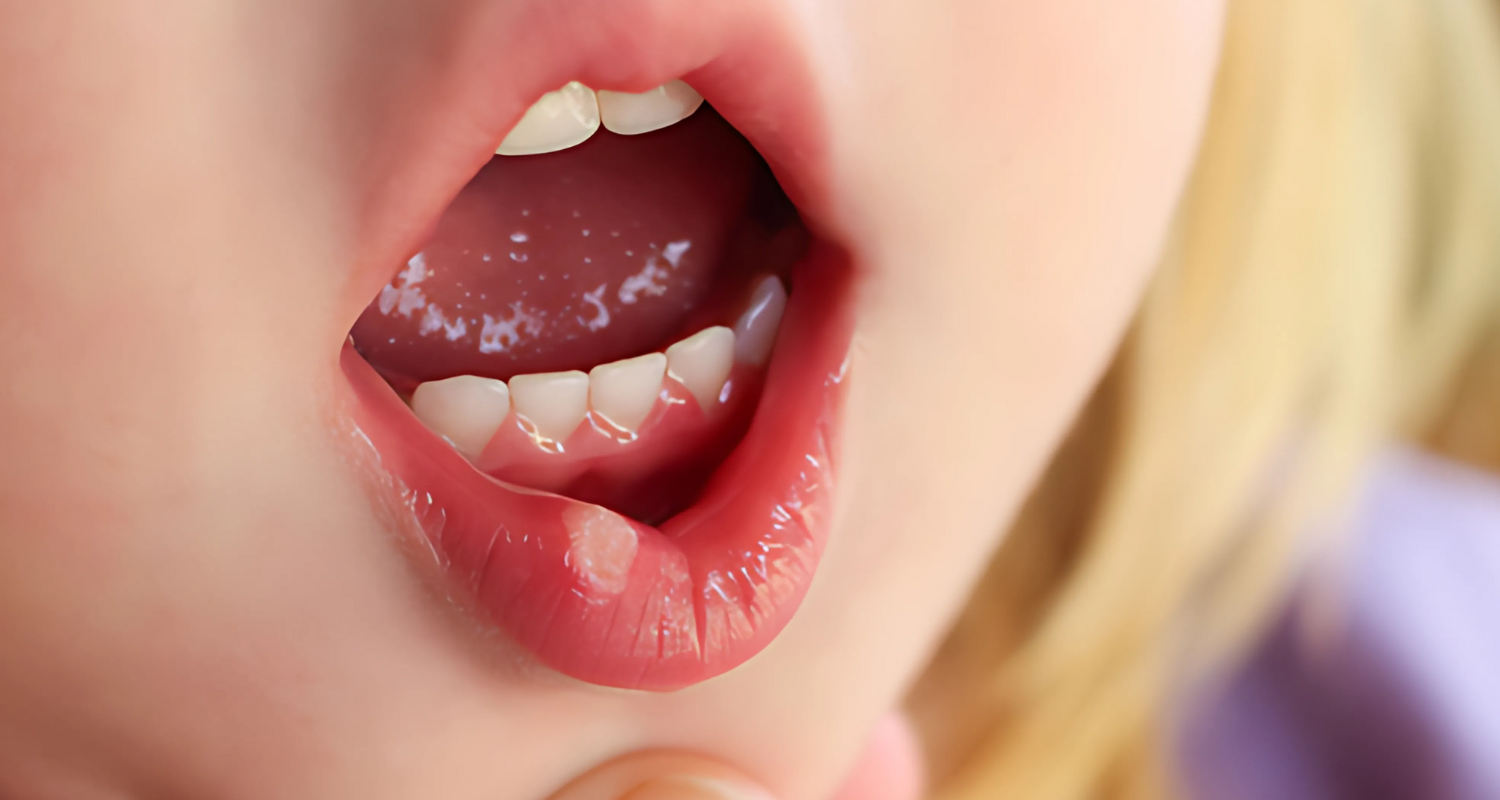Mouth ulcers, also known as canker sores, are a common issue in babies and children. These painful lesions can disrupt a child’s eating, drinking, and overall comfort, making them a significant concern for parents. Understanding the causes, symptoms, and treatment options for mouth ulcers can help manage the condition effectively and provide relief for your child. This comprehensive guide aims to offer valuable insights into mouth ulcers, their management, and preventive measures.
What Are Mouth Ulcers?
Definition and Characteristics
Mouth Ulcers: Small, painful sores that develop on the mucous membranes of the mouth, including the inner cheeks, lips, gums, and tongue. They may appear as single lesions or in clusters and can vary in size and shape.
Characteristics:
Appearance: Typically round or oval with a white or grayish center and a red halo around the edges.
Pain: Often painful, especially when eating, drinking, or brushing teeth.
Duration: Usually last for 1-2 weeks but can recur.
Types of Mouth Ulcers
Aphthous Stomatitis:
Description: The most common type of mouth ulcer, characterized by small, shallow sores that may be solitary or multiple.
Triggers: Can be triggered by stress, certain foods, or nutritional deficiencies.
Herpetic Stomatitis:
Description: Caused by the herpes simplex virus, resulting in more severe, painful sores that can appear on the gums, tongue, and roof of the mouth.
Symptoms: Often accompanied by fever, irritability, and swollen lymph nodes.
Hand, Foot, and Mouth Disease:
Description: A viral infection that causes mouth ulcers along with rashes on the hands and feet.
Symptoms: Includes fever, rash, and sore throat.
Causes of Mouth Ulcers in Babies and Children
Common Causes
Viral Infections:
Herpes Simplex Virus: Can cause severe mouth ulcers with additional symptoms like fever and irritability.
Coxsackie Virus: Associated with hand, foot, and mouth disease.
Bacterial Infections:
Streptococcal Infections: Can lead to mouth ulcers as a complication.
Oral Thrush: A fungal infection that may cause sore, white patches in the mouth.
Nutritional Deficiencies:
Vitamin Deficiencies: Lack of vitamins such as B12, folic acid, and iron can contribute to the development of mouth ulcers.
Poor Diet: A diet lacking in essential nutrients can lead to ulcer formation.
Trauma or Injury:
Accidental Bites: Biting the inside of the cheek or tongue can cause localized ulcers.
Dental Appliances: Ill-fitting braces or dentures can irritate the oral mucosa and lead to ulcers.
Allergic Reactions:
Food Allergies: Certain foods may trigger allergic reactions that manifest as mouth ulcers.
Dental Products: Allergies to toothpaste or mouthwashes can cause ulcerative lesions.
Stress and Hormonal Changes:
Emotional Stress: Stress and anxiety can be contributing factors to the development of mouth ulcers.
Hormonal Changes: In older children, hormonal changes during puberty may trigger ulcers.
Symptoms of Mouth Ulcers
Identifying the Symptoms
Pain and Discomfort:
Localized Pain: Pain is usually confined to the area of the ulcer and can be aggravated by eating, drinking, or speaking.
Sensitivity: Increased sensitivity in the affected area.
Difficulty Eating and Drinking:
Refusal to Eat: Children may refuse food or beverages due to discomfort.
Change in Eating Habits: Parents may notice a change in eating habits, such as a preference for soft foods.
Visible Ulcers:
Sores in the Mouth: Look for small, round, or oval sores with a white or grayish center and a red border.
Swelling: Occasionally, swelling around the ulcer site.
Additional Symptoms:
Fever: In cases of viral infections like herpetic stomatitis or hand, foot, and mouth disease.
Irritability: Increased fussiness or discomfort due to pain.
Diagnosis of Mouth Ulcers
Medical Evaluation
Clinical Examination:
Visual Inspection: A healthcare provider will visually examine the mouth to identify the presence and characteristics of ulcers.
Medical History: Discussion of recent illnesses, dietary habits, and any potential injuries or stressors.
Laboratory Tests:
Swabs or Cultures: In some cases, a swab of the ulcer may be taken to identify the presence of viral, bacterial, or fungal infections.
Blood Tests: To check for nutritional deficiencies or other underlying health conditions.
Referral to Specialists:
Pediatric Dentist: For persistent or severe cases that may require specialized dental care.
Allergist or Immunologist: If an allergic reaction or immune system issue is suspected.
Treatment Options for Mouth Ulcers
Home Remedies
Oral Hygiene:
Gentle Brushing: Use a soft-bristled toothbrush and fluoride toothpaste to avoid further irritation.
Mouth Rinses: Saltwater rinses can help soothe the ulcer and reduce inflammation.
Pain Relief:
Topical Gels: Over-the-counter gels and ointments can provide localized pain relief.
Cold Compresses: Applying a cold compress to the affected area may help numb the pain.
Dietary Adjustments:
Soft Foods: Offer soft, bland foods to minimize discomfort while eating.
Avoid Irritants: Steer clear of spicy, acidic, or rough-textured foods that can exacerbate pain.
Medical Treatments
Prescription Medications:
Topical Steroids: Corticosteroid creams or gels may be prescribed to reduce inflammation and pain.
Antiviral Medications: For viral infections such as herpes simplex, antiviral medications may be recommended.
Nutritional Supplements:
Vitamin Supplements: If nutritional deficiencies are identified, supplements may be prescribed to address deficiencies and support healing.
Specialized Care:
Dental Evaluation: In cases of persistent ulcers related to dental appliances or trauma, a visit to a pediatric dentist may be necessary.
Referral to Specialists: For underlying health conditions or severe cases, referral to a specialist may be required.
Preventing Mouth Ulcers
General Prevention Strategies
Good Oral Hygiene:
Regular Brushing: Ensure that children brush their teeth twice daily with fluoride toothpaste.
Regular Dental Checkups: Schedule regular visits to the dentist for routine checkups and professional cleanings.
Healthy Diet:
Balanced Nutrition: Provide a balanced diet rich in vitamins and minerals to support overall health and prevent deficiencies.
Avoid Trigger Foods: Identify and avoid any foods that may trigger allergic reactions or ulcer formation.
Stress Management:
Emotional Support: Offer support and reassurance to help manage stress and anxiety that may contribute to ulcer development.
Relaxation Techniques: Encourage relaxation techniques or activities to reduce stress levels.
Protective Measures:
Dental Appliances: Ensure that dental appliances, such as braces or dentures, are properly fitted to avoid injury.
Safe Eating Habits: Encourage children to eat slowly and chew food thoroughly to reduce the risk of accidental bites.
When to Seek Medical Help
Recognizing Red Flags
Persistent or Severe Ulcers:
Duration: If ulcers persist for more than 2 weeks or appear to be worsening.
Severity: If the pain is severe and significantly affecting the child’s ability to eat, drink, or sleep.
Additional Symptoms:
Fever and Rash: If mouth ulcers are accompanied by fever, rash, or other systemic symptoms.
Unexplained Causes: If ulcers occur frequently without an obvious cause or are associated with other health issues.
Consulting Healthcare Providers
Pediatrician or Family Doctor:
Initial Evaluation: For an initial assessment of the ulcers and to discuss potential causes and treatment options.
Specialists:
Pediatric Dentist: For issues related to dental appliances or persistent mouth ulcers.
Allergist or Immunologist: For suspected allergic reactions or immune system-related concerns.
Conclusion
Mouth ulcers in babies and children, while common, can be a source of significant discomfort and disruption. Understanding the causes, symptoms, and treatment options is essential for managing this condition effectively. By implementing preventive measures and seeking appropriate medical care when needed, parents can help alleviate their child’s discomfort and ensure prompt recovery.
Maintaining good oral hygiene, providing a balanced diet, and managing stress are key strategies for preventing mouth ulcers. For persistent or severe cases, consulting healthcare providers and specialists can provide additional support and ensure that any underlying issues are addressed.
With proactive care and appropriate treatment, most mouth ulcers resolve on their own, allowing children to return to their normal activities and enjoy better oral health.




